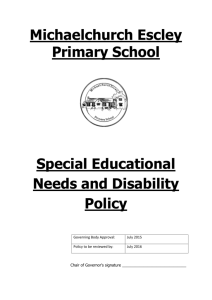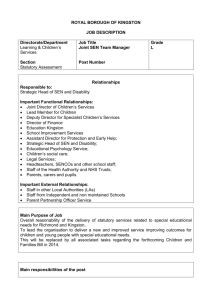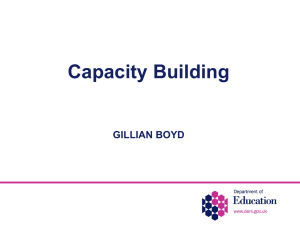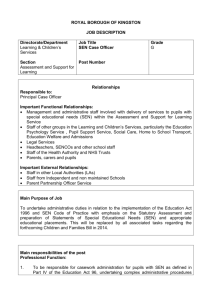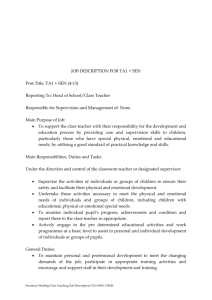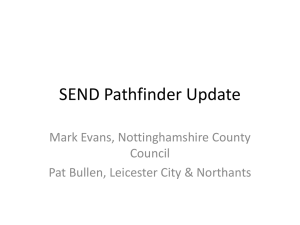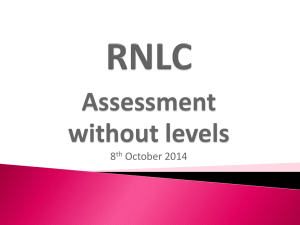Special Educational Needs and Disabilities (SEND) Reforms 2014
advertisement
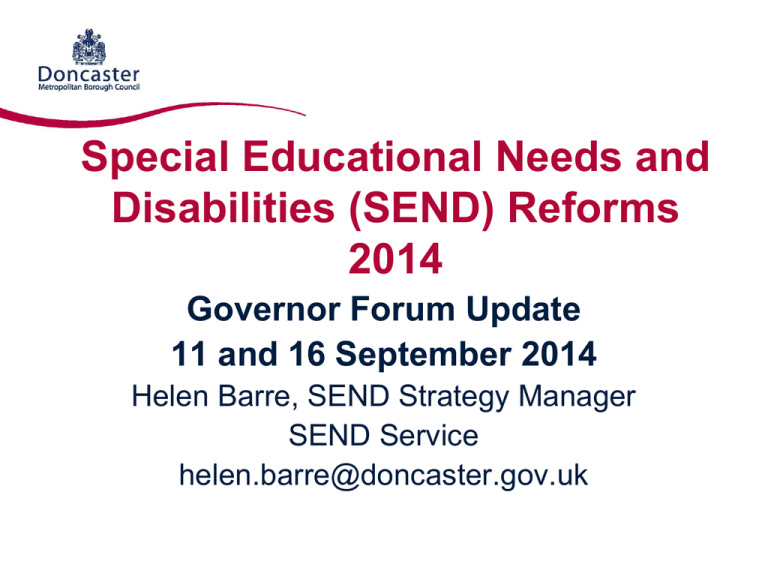
Special Educational Needs and Disabilities (SEND) Reforms 2014 Governor Forum Update 11 and 16 September 2014 Helen Barre, SEND Strategy Manager SEND Service helen.barre@doncaster.gov.uk The reform vision: Children and young people at the centre Where disagreements happen, they can be resolved early and amicably, with the option of a Tribunal for those that need it. Enablers Joint commissioning Better disagreement resolution processes Having friends Positive Wellbeing views heard Option of a Personal Budget Employment prospects 0-25 Children and young people with SEND and families Making their Extending choice and control over their support. Local offer Outcomes Children, young people and parents understand a joined up system, designed around their needs. Information, advice and support Good qualifications Integrated assessment and planning Education Health and Care plan is holistic, co-produced and focused on outcomes. Key statutory duties • • • • Must publish an SEN Information Report Must co-operate with the LA on our Local Offer Must have regard to the SEND Code of Practice 2014 Must meet the Equality Act 2010 (non-statutory DfE Advice available) • Must ensure an appropriate SENCo post holder and role • Must ensure best endeavours to meet needs • Must ensure participation with peers in wider school activities • Must inform parents when children receive SEN Support (SA/ SA+) and involve them in reviews of progress 3 x yearly and must report progress annually • Must meet Medical Needs better: DfE statutory advice The reform vision: A whole school approach Engage parent Assess Child or External support young ec Persons with SEN Engage parent Engage parent Review Plan Do Engage parent Key statutory duties • • SEN statements: continuing responsibility Education, Health and Care processes: • • • • • Child and family views, wishes and feelings Strengths and needs Identifying SMART Outcomes: aspirational Appropriate provision and adult actions (interventions, strategies, resources ) Measuring impact over time • Mental Health and Behaviour in schools (new type of need with non• • • • • statutory advice) School census reporting Personal budget option: LA must seek agreement if provision on site Must admit a child, where the school is named in an EHC plan Y8+ independent careers guidance; Y9+ focus on preparing for adulthood OFSTED four key judgements and progress made since joining the school from their starting points The reform vision: Wider reform SEND reforms are a vital part of the wider educational reform to ensure all children and young people have access to high quality teaching and equal opportunities regardless of background or circumstance. Enabling pupils with SEN to access the curriculum by understanding their needs and adapting teaching approaches. . Identification of SEN should be built into the overall approach to monitoring the progress and development of all pupils. Standards of teaching for pupils with SEN and progress made by pupils should considered as part of the school’s appraisal arrangements. National Curriculum Assessment New teachers’ pay arrangements Clear focus on the progress of all pupils – SEN support crucial to school performance. New floor standards Useful links • Doncaster Families Information Service: Local Offer site including a section on Documentation and Guidance downloads (DfE Guidance and other documents) http://www.doncasterchildrenandfamilies.info/thelocaloffer.html • Updates for parents and practitioners including the LA’s Transfer Plan and FAQ http://www.doncasterchildrenandfamilies.info/disabilitiesupdates.html • Statutory processes and documentation http://www.doncasterchildrenandfamilies.info/disabilitiesupdates.html • DfE Slide pack for schools and Governors and other resources http://www.sendpathfinder.co.uk/ www.nasen.org.uk • School Census changes https://www.gov.uk/school-census • DfE Guidance on Personal Budgets http://www.doncasterchildrenandfamilies.info/disabilitiespersonalisation.htm
